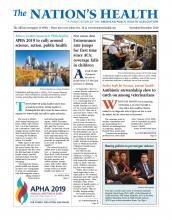Too many parents are skipping childhood vaccinations against HPV, a virus that is poorly understood by the public, new research shows.
HPV is the most common sexually transmitted infection. According to the Centers for Disease Control and Prevention, nearly everyone who is sexually active will get HPV at some point. And while most HPV infections will go away without treatment, the virus can also cause a variety of cancers, with an estimated 35,000 cases every year.
While the link between HPV and cervical cancer is well known, HPV can also lead to other types of cancer — anal, cervical, oral, penile, vaginal and vulvar.
“Vaccination rates in the U.S. are definitely sub-optimum, especially when you compare them to other industrialized countries,” Ashish Deshmukh, PhD, MPH, assistant professor at UTHealth School of Public Health in Houston, told The Nation’s Health.
Ideally, HPV vaccines should be administered in two doses to children when they are age 11 or 12. The vaccine can be administered to adults, but it may have diminished benefits, especially if someone has already had a type of HPV.
A general lack of knowledge about HPV may be a contributor to lagging vaccination rates. According to a September study in JAMA Pediatrics that was authored by Deshmukh, more than 70% of adults in the U.S. are unaware of HPV dangers — in this case, anal, penile and oral cancers.
While campaigns to alert women about the link between HPV and cervical cancer have been successful, information has not reached the public about HPV’s cancer risks to men and the importance of vaccinating boys, Deshmukh said.
“We have to be aware of the disparity,” he said. “It’s important to emphasize that HPV can cause cancer in boys.”
Part of the gender gap in vaccination rates and knowledge of the virus may be due in part to how health care providers are recommending the vaccine to parents.
A study published in September in Pediatrics found that many parents decide not to have their child vaccinated against HPV.
“A physician recommendation is one of the most important factors in vaccine acceptance by parents,” Allison Kempe, MD, MPH, lead author and professor of pediatrics at the University of Colorado School of Medicine, said in a news release. “However, we’re seeing a lack of understanding from health care providers about the need for vaccination early in adolescence and high rates of refusal on the part of parents.”
Researchers found that when health care providers recommend the HPV vaccine as strongly as they do other well-known adolescent vaccines, there is higher acceptance from parents.
Pediatricians who strongly recommended HPV vaccination reported sharp increases in acceptance by parents between 2013 and 2018, the Pediatrics study found. During that span, the vaccine rate increased by 25% in girls ages 11 or 12 and 31% in boys of the same age, resulting in about 85% and 83% acceptance rate respectively.
For more information on HPV, visit www.cdc.gov/hpv.
- Copyright The Nation’s Health, American Public Health Association









